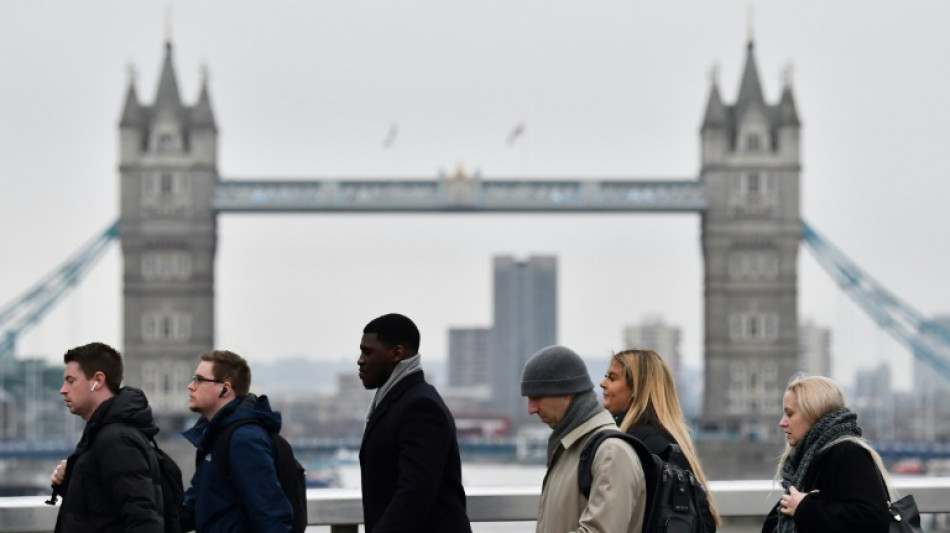
Return to 'Plan A': England lifts Omicron curbs

Commuters trooped back to the office in England on Thursday, with public transport visibly busier, after the government scrapped restrictions imposed to combat the Omicron coronavirus variant.
The return to "Plan A" measures -- ditching legal requirements for face coverings and shelving vaccine passports -- comes as the number of positive Covid-19 cases has fallen sharply from record levels.
Infection rates have plateaued in recent days and are still high -- more than 100,000 confirmed cases were recorded on Wednesday -- but the National Health Service is no longer facing imminent crisis.
Prime Minister Boris Johnson said restrictions could be lifted due to "the success of our booster rollout, the tireless work of the NHS and the amazing public response".
But he urged more people to get vaccinated and warned: "The pandemic is not over. Everyone should remain cautious."
Johnson, who spent several days in intensive care with Covid in 2020, introduced the so-called "Plan B" restrictions on December 8, after warning of a looming "tidal wave" of Omicron.
Face masks were required in all enclosed spaces and people were told to work remotely. Vaccine documentation to enter places such as nightclubs, football grounds and large-scale events was also controversially required.
- 'Wonderful' -
In the British capital, public transport such as the London Underground, was busier after the restrictions were lifted at midnight.
On the streets around St Paul's Cathedral on Wednesday, there was general public backing for the end to restrictions, which comes after more than 37 million people had booster jabs.
"I think it's a really good thing," said Elizabeth Hynes, 71, who is originally from Ireland but has lived in England for 47 years.
"I was coming up the lifts here at St Paul's and I was looking at all the shows" being advertised, she said of the posters inside the underground station.
"And I thought, 'How wonderful. It's like old times'.
Hynes said she had stage-4 melanoma skin cancer but had so far "been lucky" and not caught Covid.
"We don't know about tomorrow. We have to live... for today, trying to get a bit of enjoyment out of life," she added.
Julia, 28, from Spain, said it was time to "have a normal life".
"It's been two years and it's time to take responsibility ourselves," she said as she waited for the St Paul's eatery in which she works to open.
- 'Traumatic' -
England had lifted restrictions on July 19 last year but then re-introduced thempa as the Omicron wave hit.
Limits on visitors to care homes in England will also be scrapped from next week, with residents able to have unlimited visits from family and friends.
Businesses will still be able to impose restrictions but they will no longer be a legal requirement.
On public transport in London, for example, face coverings are still mandatory. But secondary school students will no longer have to wear masks.
US holidaymaker Ethan Letson, 24, agreed with London Mayor Sadiq Khan's decision to keep face coverings as a condition of travel.
"I still wear the mask on public transport. I will wear it in very crowded areas like the Underground. It's so tight down there, you could get sick at any time," he said.
Unlike Scotland and Wales, which set their own health policy, England kept nightclubs and bars open over the festive period.
But businesses still took a heavy hit as punters stayed at home.
Hospitality workers in the business district around St Paul's said things had only just started to improve.
"The last week, business has started to pick up again. Around Christmas it was dead," said bartender Lewis Colby, 39.
"People aren't so scared anymore, trains are busier coming into work, people are starting to drink more."
Despite the lifting of restrictions, those who test positive for coronavirus must still self-isolate for a minimum of five days.
(T.Renner--BBZ)

 London
London

 Manchester
Manchester
 Glasgow
Glasgow
 Dublin
Dublin
 Belfast
Belfast
 Washington
Washington
 Denver
Denver
 Atlanta
Atlanta
 Dallas
Dallas
 Houston Texas
Houston Texas
 New Orleans
New Orleans
 El Paso
El Paso
 Phoenix
Phoenix
 Los Angeles
Los Angeles



